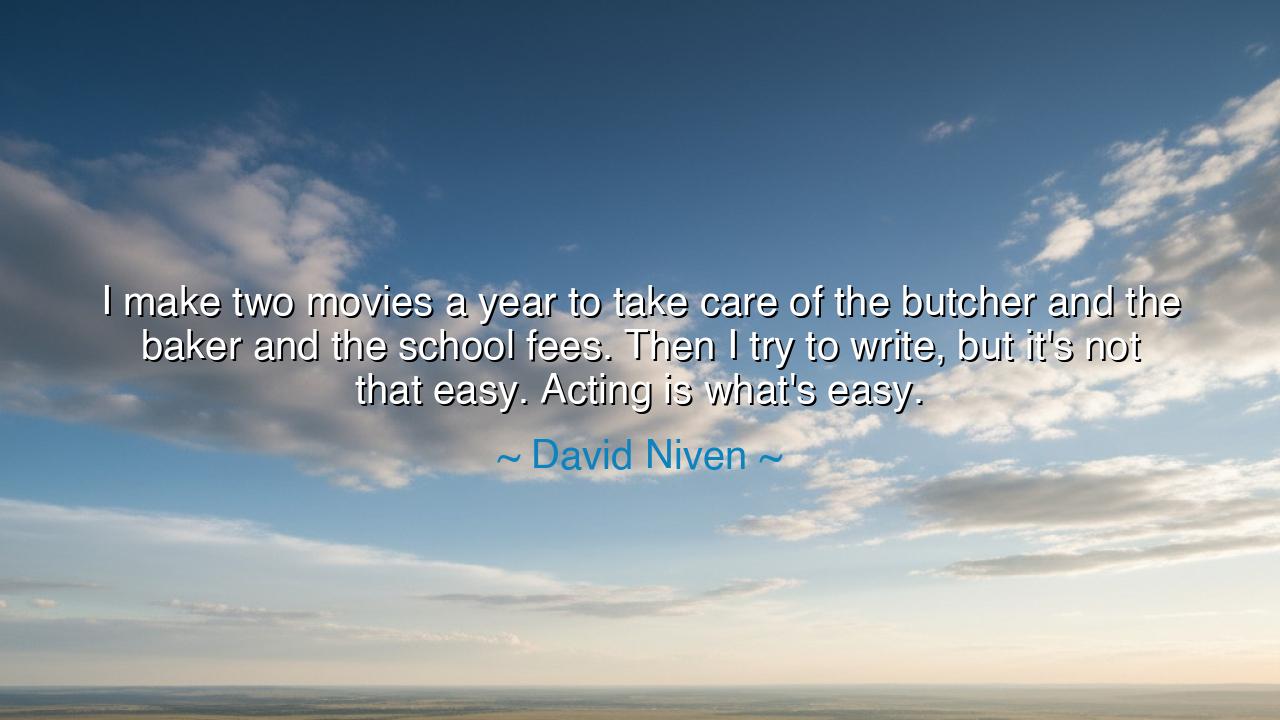
I make two movies a year to take care of the butcher and the
I make two movies a year to take care of the butcher and the baker and the school fees. Then I try to write, but it's not that easy. Acting is what's easy.






Gather, O children of the future, and hear the words of David Niven, a man who knew the weight of both work and art, and who spoke with the wisdom of one who had lived among both. He said, "I make two movies a year to take care of the butcher and the baker and the school fees. Then I try to write, but it's not that easy. Acting is what's easy." In these words, Niven speaks of the delicate dance between duty and passion, between the demands of daily life and the pursuit of something greater, something that stirs the soul.
At first glance, this may seem like a simple declaration of a man fulfilling his obligations, but look deeper, O children, and you will see a profound truth. Acting, for Niven, was not merely a job, but an expression of his natural talent, something he could do with relative ease. It was the means by which he earned his bread and provided for his loved ones—the butcher, the baker, and the school fees were the unglamorous realities of life that demanded his attention. Yet in this seemingly mundane task, he found an escape from the struggle to create something more meaningful—writing, which, in his own words, was far more difficult.
Consider, O children, the story of Homer, the great poet of old, who was driven to create epics that would echo through the ages. He too, like Niven, faced the tension between the needs of the world and the desires of his own spirit. For although he wove tales that moved hearts and minds, it was not an easy task. Writing the Iliad and the Odyssey was not an act of ease, but one of great struggle and discipline, filled with moments of doubt and uncertainty. The poet, like Niven, was drawn to the creation of something grand, but the demands of life, with all its earthly cares, did not always allow for such indulgences.
Niven’s reflection, then, speaks not only to the realities of living but to the eternal conflict between the practical and the ideal. How often do we find ourselves caught in the tension between what we must do to survive and what we feel we are meant to create? The world requires us to work—to meet our responsibilities, to tend to the needs of others—but the artist’s heart is often pulled toward the creation of something that can transcend the ordinary. Niven found acting to be the way to meet his earthly needs, but writing, the craft that came from his soul, was a more difficult task. It required not just skill, but devotion, and a willingness to struggle against the forces of doubt and distraction.
It is a struggle that all artists, all dreamers, must face. Take the story of Vincent van Gogh, a man whose name is now synonymous with genius, but whose life was marked by poverty and despair. Van Gogh painted not for wealth or fame, but for the sheer love of creation. Yet, despite his passion, his art did not sustain him. He struggled to make ends meet, to care for himself, just as Niven did with his movies. Van Gogh, like Niven, knew the burden of making a living while striving for something greater. The world demands the practical, but the artist yearns for the eternal.
And so, O children of the future, remember this truth: success is not merely the result of grand artistic pursuits, but of the daily work that allows us to keep creating. There will be times when you must tend to the needs of the world—the butcher, the baker, and the school fees—and in those moments, you must not see these as distractions, but as part of the fabric of life. Acting, in whatever form it may take, is the way we provide for ourselves, but it is the deeper work—the writing, the painting, the creating—that is the essence of the soul. Creating something that is lasting, something that speaks to the heart of humanity, requires not just talent, but discipline, struggle, and the ability to balance both the practical and the ideal.
The lesson, O children, is simple: in the pursuit of greatness, you must learn to balance both the practical and the artistic. Do not be disheartened when you are required to fulfill your earthly duties, for these are the very things that enable you to continue on your path. The work you do to provide for yourself and others is just as important as the grand dreams you pursue. The tension between these two forces is what will sharpen you, and it is in that balance that you will find the strength to continue.
As you walk your path, remember Niven’s words and the lives of those who came before him. Success is not found in the abandonment of duty, nor in the sacrifice of your dreams. It is found in the delicate balance between the world’s demands and the longing of your soul. Work, yes, for the butcher and the baker, but also strive to create, to write, to dream. And in the end, it is the work that comes from your heart, your true calling, that will be your lasting legacy.






AAdministratorAdministrator
Welcome, honored guests. Please leave a comment, we will respond soon